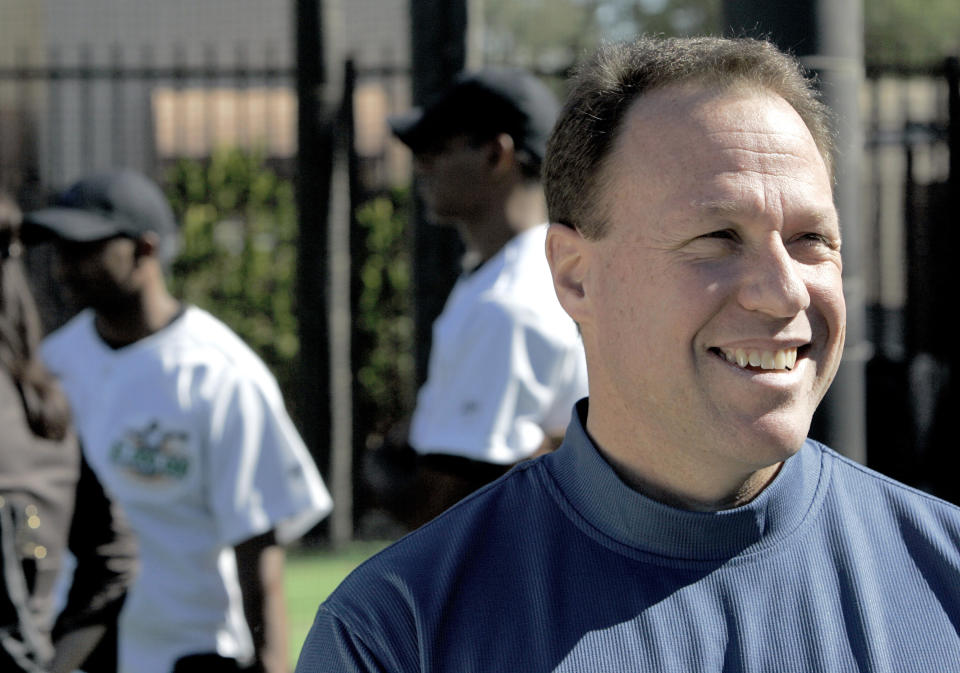Barry Bonds' former agent Jeff Borris says baseball owners still collude against players

If there’s someone who knows a thing or two about collusion in baseball, it would be Jeff Borris. The longtime agent represented Barry Bonds and filed over a dozen claims in the mid-’80s during the heyday of owners’ collusion.
Borris says that the owners are continuing the practice of suppressing salaries to this day, as baseball continues a second consecutive slow-moving offseason. In an interview on “The Jonah Keri Podcast” on Monday, he spelled out the extent to which he believes the owners are colluding.
Owners aren’t as blatant as they were in the ’80s, when eventual MVP Andre Dawson couldn’t find work and eventually gave the Chicago Cubs a blank contract, saying he would play for any amount of money, and future Hall of Famer Tim Raines had to wait until May to get a contract. Since arbitrator Tom Roberts ruled that the owners had to pay players $280 million in 1990, Borris says owners have gotten more creative.
“It was a very dark time in baseball,” Borris said on the podcast. “You would think that the owners would have abandoned, in the future, their practices because in essence they were nailed for doing what they were doing. But they didn’t abandon it. What they did was they became more sophisticated about it, and it’s continued on throughout the years, and it exists up until this very day. Except it’s harder to point a finger at them and say ‘You did this, and you did that.’”
Why aren’t teams spending their money?
Eyebrows have been raised lately as Major League Baseball has raked in record revenue for the 16th straight season, reaching $10.3 billion in 2018, which doesn’t count the $2.6 billion sale of BAMTech to Disney. At the same time, MLB payrolls took the biggest dip last season since 2004 with teams spending a combined $115 million less than they did in 2017.
“The cost of labor should hand-in-hand go up as well,” said Borris. “When that doesn’t happen, I think that is an indication of a tremendous collusive effort on behalf of the owners to suppress salaries for the players. The owners over the years have gotten more sophisticated in the methodology in how they go about doing that, and I think that’s what you’re seeing right now.”
The lack of spending is very surprising and caught players off guard last winter. The three biggest free agent contracts weren’t signed until February, and many players got far less than they expected. Through a combination of a luxury tax that has acted as a soft cap without a matching salary floor and a relatively weaker free agent market, there were reasons to see why teams might be spending less in anticipation of an upcoming free agent bonanza.
However, even with two of the best free agents ever available — 26-year-old superstars Bryce Harper and Manny Machado — teams are still not spending. Harper and Machado remained unsigned with only three reported suitors despite not reaching their primes yet. All-Stars Yasmani Grandal and Josh Donaldson had to settle for one-year deals, while A.J. Pollock, Craig Kimbrel and Dallas Keuchel are still on the market.
“The owners, they still feel that they own the game, they are the game, and they are going to say who can play, and when they can play and how much they play for,” Borris said. “It’s really not a true, free, open, competitive market like it would be in any other industry or profession in the United States.”
Collusion can be very hard to prove
As Borris can attest, collusion can be obvious to many but very hard to prove in the court of law.
Borris represented Bonds after his 2007 season in which he broke Hank Aaron’s career home run record, made his 14th All-Star Game and led the league with a .480 on-base percentage. But despite all that, no team would even offer Bonds a league-minimum contract. Borris filed a grievance, but an arbitrator ruled in favor of the league because there was no smoking gun.
“[It] was utterly preposterous, right there on its face,” Borris said. “You cannot take a player who has statistical performance like that, and it’s unfathomable that he cannot even get a job at any number, let alone the minimum salary, but for him being blacklisted from the game.”
Borris isn’t saying that MLB is blackballing any players, although former Oakland Athletics catcher Bruce Maxwell may be facing Colin Kapernick-esque treatment after kneeling during the national anthem. What is strange, though, is how little the owners are willing to spend despite record revenues.
Years ago, the discussion was whether Harper and Machado would get $400 million or $500 million contracts based on their performance and age, along with the history of free agent contracts. But now the Chicago White Sox, one of Machado’s leading suitors, reportedly may not even offer $200 million. Are all the teams suddenly working as efficient hedge funds instead of the public trusts they purport to be? Borris certainly thinks things continue to be awry.
More from Yahoo Sports:
• Robinson: Tough questions ahead for Cowboys in the offseason
• Brown: Rams winning the heart of Los Angeles
• Report: Gronk will consider retirement after the season
• Report: Sarkisian heading to Alabama, passing over NFL

